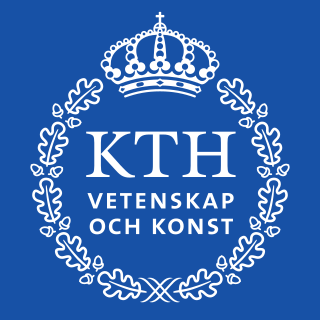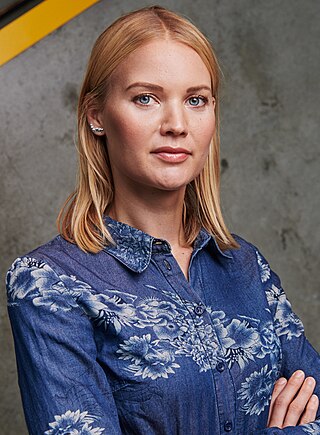
Alfred Bernhard Nobel was a Swedish chemist, inventor, engineer and businessman. He is known for inventing dynamite as well as having bequeathed his fortune to establish the Nobel Prize. He also made several important contributions to science, holding 355 patents in his lifetime. Nobel's most famous invention was dynamite, an explosive using nitroglycerin; it was patented in 1867.

The Nobel Prizes are five separate prizes that, according to Alfred Nobel's will of 1895, are awarded to "those who, during the preceding year, have conferred the greatest benefit to humankind." Alfred Nobel was a Swedish chemist, engineer, and industrialist most famously known for the invention of dynamite. He died in 1896. In his will, he bequeathed all of his "remaining realisable assets" to be used to establish five prizes which became known as "Nobel Prizes". Nobel Prizes were first awarded in 1901.

The KTH Royal Institute of Technology, abbreviated KTH, is a public research university in Stockholm, Sweden. KTH conducts research and education in engineering and technology and is Sweden's largest technical university. Currently, KTH consists of five schools with four campuses in and around Stockholm.

Alva Myrdal was a Swedish sociologist, diplomat and politician. She was a prominent leader of the disarmament movement. She, along with Alfonso García Robles, received the Nobel Peace Prize in 1982. She married Gunnar Myrdal in 1924; he received the Nobel Memorial Prize in Economic Sciences in 1974, making them the sixth ever married couple to have won Nobel Prizes, and the first to win independent of each other.

Ragnar Arthur Granit was a Finnish-Swedish scientist who was awarded the Nobel Prize in Physiology or Medicine in 1967 along with Haldan Keffer Hartline and George Wald "for their discoveries concerning the primary physiological and chemical visual processes in the eye".

The Regeneron International Science and Engineering Fair (ISEF) is an annual science fair in the United States. It is owned and administered by the Society for Science, a 501(c)(3) non-profit organization based in Washington, D.C. Each May, more than 1800 students from roughly 75 countries and territories compete in the fair for scholarships, tuition grants, internships, scientific field trips and the grand prizes, including one $75,000 and two $50,000 college scholarships. All prizes together amount to over $8,000,000. Two major awards ceremonies are the Special Awards Organization Presentation and the Grand Awards Ceremony. The International Science and Engineering Fair was founded in 1950 by Science Service and was sponsored by Intel from 1997 to 2019. Regeneron Pharmaceuticals became the title sponsor for ISEF in 2020, but the event was cancelled that year and replaced with an online version due to the COVID-19 pandemic. The 2021 ISEF was a fully virtual event while 2022 was held online and in-person in Atlanta, GA, and 2023 was in person in Dallas, TX. The 2024 ISEF will be held in person in Los Angeles, CA.

The International Falcon Movement – Socialist Educational International (IFM-SEI) is an international non-profit organisation based in Belgium that campaigns for children's rights. It is a fraternal organisation of Socialist International and works closely with International Union of Socialist Youth (IUSY) and Young European Socialists. IFM-SEI is a full member of the European Youth Forum (YFJ) which operates within the Council of Europe and European Union area and works closely with both these bodies. In Latin-America it is a full member of the Foro Latin-America de Juventud (FLAJ). It is also part of the International Coordination Meeting of Youth Organisations (ICMYO) which consists of worldwide active youth organisations and regional youth platforms coordinating their activities towards the UN and its agencies.

The London International Youth Science Forum is a two week residential forum held at Imperial College London and The Royal Geographical Society.
The Canadian Institute for Advanced Research (CIFAR) is a Canadian-based global research organization that brings together teams of top researchers from around the world to address important and complex questions. It was founded in 1982 and is supported by individuals, foundations and corporations, as well as funding from the Government of Canada and the provinces of Alberta and Quebec.

The Nobel family, is a prominent Swedish and Russian family closely related to the history both of Sweden and of Russia in the 19th and 20th centuries. Its legacy includes its outstanding contributions to philanthropy and to the development of the armament industry and the oil industry. Some of its foremost members are Immanuel Nobel the Younger, the engineer, developer of underwater naval mines and inventor of the rotary lathe used to produce plywood, Ludvig Nobel, the founder of Branobel and one of the richest and the most important men in Russia at his time, and Alfred Nobel, the inventor of dynamite who left the major part of his estate to the creation of the Nobel Prizes.

The Student Association at Stockholm School of Economics organizes all students enrolled at the Stockholm School of Economics (SSE). SSE is a leading European academic institution for education and research in the fields of economics, finance, corporate law, business, managerial sciences and marketing. It is situated in Stockholm, capital of Sweden. SASSE is affiliated with the Stockholm Federation of Student Unions.
The Molecular Frontiers Foundation (MFF) was founded under the auspices of the Royal Swedish Academy of Sciences in 2007 by Bengt Nordén, a professor of physical chemistry at Chalmers University of Technology in Sweden and the former chair of the Nobel Committee for Chemistry. Part of the mission of MFF according to Nordén is to counter the "increasingly bad image that chemistry has in society" and the "decreasing interest in science by the young generation". Founding members of Molecular Frontiers Foundation include Magdalena Eriksson, Lorie Karnath,(founder Molecular Frontiers Journal), Shuguang Zhang (MIT).

The Nobel Memorial Prize in Economic Sciences, officially the Sveriges Riksbank Prize in Economic Sciences in Memory of Alfred Nobel, is an economics award funded by Sveriges Riksbank and administered by the Nobel Foundation.

The Nobel Prize in Chemistry is awarded annually by the Royal Swedish Academy of Sciences to scientists in the various fields of chemistry. It is one of the five Nobel Prizes established by the will of Alfred Nobel in 1895, awarded for outstanding contributions in chemistry, physics, literature, peace, and physiology or medicine. This award is administered by the Nobel Foundation, and awarded by the Royal Swedish Academy of Sciences on proposal of the Nobel Committee for Chemistry which consists of five members elected by the Academy. The award is presented in Stockholm at an annual ceremony on 10 December, the anniversary of Nobel's death.
The Mendel Lectures is a series of lectures given by the world's top scientists in genetics, molecular biology, biochemistry, microbiology, medicine and related areas which has been held in the refectory of the Augustian Abbey of St. Thomas in Brno, Czech Republic since May 2003. The lectures were established to celebrate the 50th anniversary of the discovery of the structure of deoxyribonucleic acid (DNA) by James Watson (1928) and Francis Crick (1916-2004). The Mendel Lectures are named in honour of Gregor Johann Mendel (1822-1884), the founder of genetics, who lived and worked in the Augustinian Abbey in Brno 1843-1884. Based on his experiments conducted in the abbey between 1856 and 1863, Mendel established the basic rules of heredity, now referred to as the laws of Mendelian inheritance. The Mendel Lectures are organized by the Masaryk University, the Mendel Museum, and the St. Anne's University Hospital Brno. The twentieth season of the Mendel Lectures is running at present. More than 130 top scientists, including many Nobel Prize winners, have visited Brno to give a Mendel Lecture, for example Tim Hunt, Jack W. Szostak, John Gurdon, Elizabeth Blackburn, Paul Nurse, Venkatraman Ramakrishnan, Günter Blobel, Kurt Wüthrich, Jules A. Hoffmann, Aaron Ciechanover, Ada Yonath, Paul Modrich, Eric F. Wieschaus, Fraser Stoddart, Ben Feringa, Brian K. Kobilka and others.

Claudia Olsson is a Swedish technology expert, business leader, and speaker with a background in engineering and economics. She is CEO and founder of Exponential AB, founder of Stellar Capacity AB, an Associate Faculty member at Singularity University, a David Rockefeller Fellow at the Trilateral Commission, as well as a Young Global Leader with the World Economic Forum.
Sveriges Unga Muslimer (SUM), previously named Sveriges Muslimska Ungdomsförbund (SMUF), is an Islamic youth umbrella organisation in Sweden. The organisation was formed in 1991. SUM itself a member organisation of the following umbrella organisations: the Muslim Council of Sweden, Forum for European Muslim Youth and Student Organisations (FEMYSO) and Ibn Rushd studieförbund. In 2016 it had about 4000 members.

Emma Maria Frans is a postdoctoral researcher in medical epidemiology at Karolinska Institutet in Stockholm and well-known science communicator in Sweden. She is also known for writing the column "Vetenskapskollen" in the newspaper Svenska Dagbladet, where she examines the correctness and scientific accuracy of sensational news and popular science articles.
Marie Ann-Charlotte Dacke is a professor in the Lund Vision Group at Lund University in Sweden. She received an Ig Nobel Prize in 2013 for her work on the navigation system of dung beetles. She is also a panel member on the Swedish TV show Studio Natur, and was named best science communicator in Sweden during the 2012 Forskar Grand Prix.
Beatrice Crona is an ecologist, a professor at Stockholm University, and the Executive Director of the Program on Global Economic Dynamics and the Biosphere at the Royal Swedish Academy of Sciences. In 2023 she became a Science Director of the Stockholm Resilience Centre.
 Australia
Australia  China
China  Denmark
Denmark  Hungary
Hungary  India
India  Israel
Israel  Japan
Japan  Mexico
Mexico  Norway
Norway  Poland
Poland  Russia
Russia  Singapore
Singapore  South Africa
South Africa  South Korea
South Korea  Switzerland
Switzerland  United Kingdom
United Kingdom  United States
United States 











